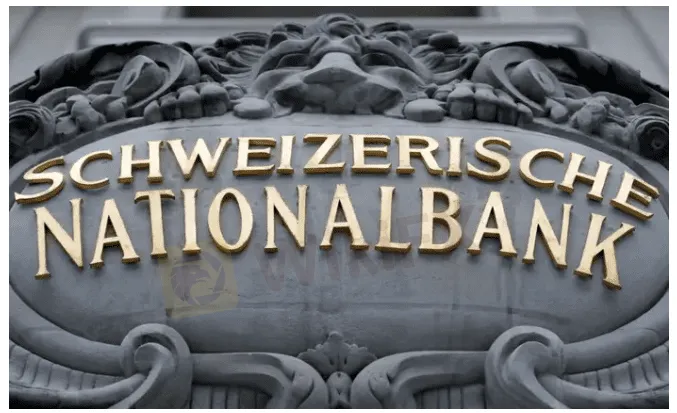简体中文
繁體中文
English
Pусский
日本語
ภาษาไทย
Tiếng Việt
Bahasa Indonesia
Español
हिन्दी
Filippiiniläinen
Français
Deutsch
Português
Türkçe
한국어
العربية
Swiss National Bank posts $34 billion loss as bond losses bite
Abstract:The Swiss National Bank reported a first quarter loss of 32.8 billion Swiss francs ($33.75 billion), the central bank said on Thursday, as lower bond prices and the higher franc dented the value of its foreign currency investments.

The bank made a loss of 36.8 billion francs from its foreign currency investments built up during its campaign to tame the franc.
The bank made a profit of 1.6 billion francs from interest on its bond portfolio and 800 million francs in dividends from the stocks and shares it holds in companies which include Starbucks and Google owner Alphabet.
But this was wiped out by a big valuation loss on its bond portfolio, which makes up 80% of the 977 billion francs held by the SNB in foreign currency investments.
As bond prices tumbled earlier this year, due to investors anticipating higher interest rates by central banks fighting resurgent inflation, the SNB made a valuation loss of 25.1 billion francs on its fixed income holdings.
The central bank also made a loss of 10.7 billion francs from its share portfolio, and a 3.4 billion francs exchange rate related loss as the more expensive Swiss franc reduced the value of its foreign investments when translated back into francs.
The franc surged in value earlier this year as investors sought safe havens after war erupted in Ukraine, while stock markets also declined.
The flight for safety increased the price of gold during the period, with the SNB making a valuation gain of 4.2 billion francs on its gold holdings.
But it made only a tiny profit of 10.6 million francs from its Swiss franc positions, mainly from the negative interest rates it charges on some domestic banks for parking their money with it overnight. The negative interest rate is one of the tools used by the SNB to block the rise of the Swiss franc.
($1 = 0.9718 Swiss francs)

Disclaimer:
The views in this article only represent the author's personal views, and do not constitute investment advice on this platform. This platform does not guarantee the accuracy, completeness and timeliness of the information in the article, and will not be liable for any loss caused by the use of or reliance on the information in the article.
Read more

The Hidden Checklist: Five Unconventional Steps to Vet Your Broker
Forex broker scams continue to evolve, employing new tactics to appear credible and mislead unsuspecting traders. Identifying these fraudulent schemes requires vigilance and strategies beyond the usual advice. Here are five effective methods to help traders assess the legitimacy of a forex broker and avoid potential pitfalls.

Doo Financial Obtains Licenses in BVI and Cayman Islands
Doo Financial, a subsidiary of Singapore-based Doo Group, has expanded its regulatory footprint by securing new offshore licenses from the British Virgin Islands Financial Services Commission (BVI FSC) and the Cayman Islands Monetary Authority (CIMA).

CFI’s New Initiative Aims to Promote Transparency in Trading
A new programme has been launched by CFI to address the growing need for transparency and awareness in online trading. Named “Trading Transparency+: Empowering Awareness and Clarity in Trading,” the initiative seeks to combat misinformation and equip individuals with resources to evaluate whether trading aligns with their financial goals and circumstances.

Malaysian-Thai Fraud Syndicate Dismantled, Millions in Losses Reported
The Royal Malaysia Police (PDRM) has received 26 reports concerning the Nicshare and CommonApps investment schemes, both linked to a major fraudulent syndicate led by a Malaysian citizen. The syndicate’s activities came to light following the arrest of its leader by Thai authorities on 16 December.
WikiFX Broker
Latest News
ASIC Sues Binance Australia Derivatives for Misclassifying Retail Clients
Top 10 Trading Indicators Every Forex Trader Should Know
WikiFX Review: Is FxPro Reliable?
Malaysian-Thai Fraud Syndicate Dismantled, Millions in Losses Reported
Trading frauds topped the list of scams in India- Report Reveals
AIMS Broker Review
The Hidden Checklist: Five Unconventional Steps to Vet Your Broker
YAMARKETS' Jingle Bells Christmas Offer!
Revolut Leads UK Neobanks in the Digital Banking Revolution
Fusion Markets: Safe Choice or Scam to Avoid?
Currency Calculator


